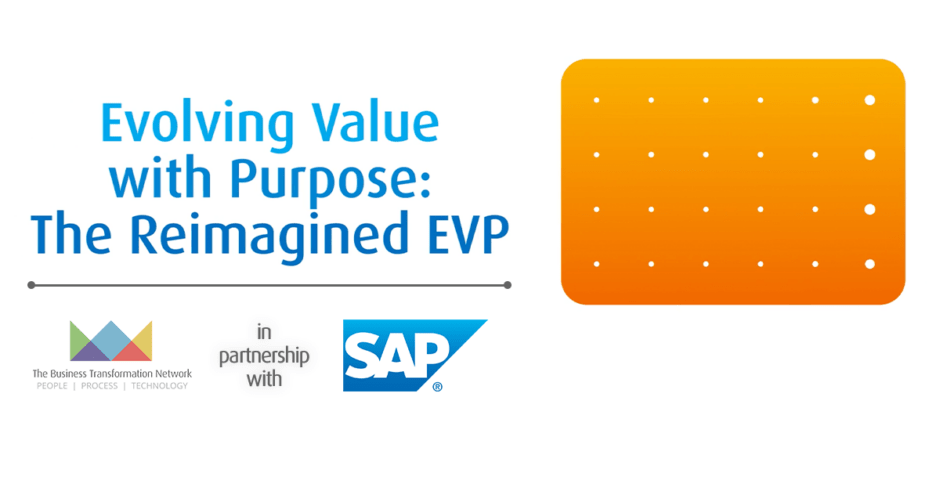Being an employer of choice is now more important than ever as talent becomes a challenge for all. Organisations that haven’t yet started to adjust their Employer Value Proposition (EVP) to the changing expectation are left with a real risk of being left behind.
The BTN recently partnered with SAP SuccessFactors for a fascinating virtual round table with executive People leaders from some of the world’s leading organisations.
The conversation brought about the following points:
Align people strategy with business strategy
The role of purpose has come to fruition over the past 18 months with not just employees taking an invested interest in the overall purpose of an organisation but organisations having to reimagine what the purpose actually is. Communicating as an enterprise in an authentic and purposeful way is one that is now actively being searched for by potential employees yet there should still be simplicity to understanding what the proposition is.
People leaders were at the heart of ‘putting the fire out’ in the midst of the pandemic but their roles have now shifted as we rethink what we are offering to our people and how this is then promoted externally and internally. With regard to the purpose of the organisation, how do we lift something that is so critical, into the top team and plant it into the DNA of the organisation? Building upon this, how can you be authentic about the purpose when the top leaders don’t really care? The group discussed how part of the challenge is that the executive leaders are effectively focused on simply wanting to make money. This then becomes a key challenge for people leaders to effectively communicate that it needs to be critical for the top leaders to be on-board as there is a direct relation between purpose and profit.
Our employees are after the same thing as our customers. If our customers are making purchases based on an increased environmental and social awareness within an organisation, we should be making active improvements on our environmental, social and corporate governance (ESG) and bringing it in line with purpose. We should be looking at what is happening in the external environment, asking what this means for our core business and bringing our people on the journey.
If we don’t have what the heart of the business is at the heart of what we do, there will be a missed connection with purpose. We need to weave more purpose-led conversations within everything we do.
The great resignation or the great realisation
These moments are our chance to bring about real change within our organisations. Many of the group spoke openly about how the ‘great resignation’ was having a direct impact on their people strategy in some way, shape or form.
What it means for one employee to turn up to work is very different with regard to why another employee turns up. Do our employees understand what the wider purpose is of the organisation and therefore how they are/can specifically living/live up to it? Historically, organisations would always have in place a notion of purpose as part of their key messaging but the gap is widening between what organisations are saying and what they are doing…and employees are catching on. Every organisation has to have a purpose but how do we then translate that into something that is actionable and measurable?
The group spoke about some of the questions that they are asking their employees in their pulse surveys such as are you proud to work at the organisation. The conversation opened up discussions around the role of authenticity and how we balance our sell from an Employer Value Proposition (EVP) perspective Vs. the reality as our employee’s experience. There were conversations around the Executive Leadership teams within certain organisations believing that if purpose became a golden thread, it would create a golden singular culture, whereas the reality is that organisations will always have subcultures. We must ensure we keep our purpose real through the use of stories to create a narrative and truly showcase the behaviours we want to be aligned with our organisation.
Basic wiring of the human brain hasn’t changed, discussions have changed
Are we clear on the behaviours we want to see in our organisations culturally? A lot of the challenges around the evolving EVP is focused on not only the purpose but on an organisations efforts within DE&I. Organisations need to be seen to be levelling up and being truly representative of the wider community.
The question was asked whether there had been a defined change in Maslow’s needs? Do employees now ask for something more from the organisations that they represent?
The fundamentals have shifted. We need to be asking ourselves whether we have got the engagement from our employees. If we spent more time understanding peoples needs as a human, then it cuts through loads of different types of purposes.
Discussions have changed. We must have more clarity on the leadership behaviours we require within our organisations. If you want a purpose-driven org but have line managers that aren’t up to speed, you’ll fail. We must create and embed more human-centric leaders and put our people back at the centre of success. Shining a light on the impact and belief that we can’t do any of this without the people will result in creating a purpose for our people.
The needs of the team and ultimately, the needs of the individual will determine the success of the overall organisation. The answer to the question, “what kind of life can I lead working for this organisation?” for our employees must be a positive one and our managers must embody what we are trying to achieve and be individual & humanistic.
We must ensure we have the finger on the pulse as the goalposts are moving daily. We must ensure we can do the basics brilliantly and build upon those successes.




